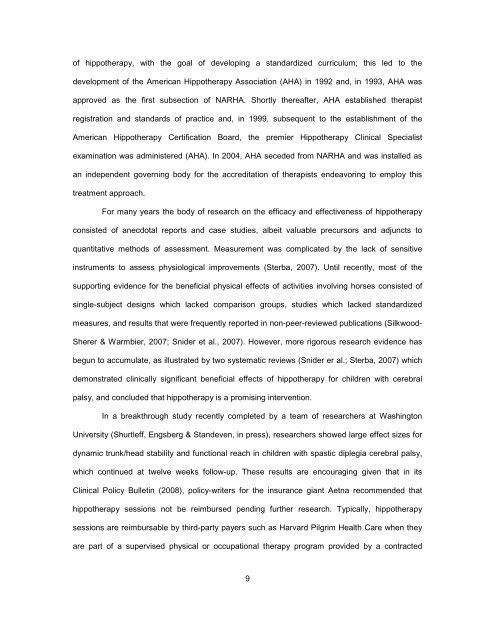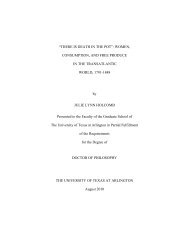A SYSTEMATIC REVIEW OF THE EFFECTS OF PSYCHOTHERAPY ...
A SYSTEMATIC REVIEW OF THE EFFECTS OF PSYCHOTHERAPY ...
A SYSTEMATIC REVIEW OF THE EFFECTS OF PSYCHOTHERAPY ...
Create successful ePaper yourself
Turn your PDF publications into a flip-book with our unique Google optimized e-Paper software.
of hippotherapy, with the goal of developing a standardized curriculum; this led to the<br />
development of the American Hippotherapy Association (AHA) in 1992 and, in 1993, AHA was<br />
approved as the first subsection of NARHA. Shortly thereafter, AHA established therapist<br />
registration and standards of practice and, in 1999, subsequent to the establishment of the<br />
American Hippotherapy Certification Board, the premier Hippotherapy Clinical Specialist<br />
examination was administered (AHA). In 2004, AHA seceded from NARHA and was installed as<br />
an independent governing body for the accreditation of therapists endeavoring to employ this<br />
treatment approach.<br />
For many years the body of research on the efficacy and effectiveness of hippotherapy<br />
consisted of anecdotal reports and case studies, albeit valuable precursors and adjuncts to<br />
quantitative methods of assessment. Measurement was complicated by the lack of sensitive<br />
instruments to assess physiological improvements (Sterba, 2007). Until recently, most of the<br />
supporting evidence for the beneficial physical effects of activities involving horses consisted of<br />
single-subject designs which lacked comparison groups, studies which lacked standardized<br />
measures, and results that were frequently reported in non-peer-reviewed publications (Silkwood-<br />
Sherer & Warmbier, 2007; Snider et al., 2007). However, more rigorous research evidence has<br />
begun to accumulate, as illustrated by two systematic reviews (Snider er al.; Sterba, 2007) which<br />
demonstrated clinically significant beneficial effects of hippotherapy for children with cerebral<br />
palsy, and concluded that hippotherapy is a promising intervention.<br />
In a breakthrough study recently completed by a team of researchers at Washington<br />
University (Shurtleff, Engsberg & Standeven, in press), researchers showed large effect sizes for<br />
dynamic trunk/head stability and functional reach in children with spastic diplegia cerebral palsy,<br />
which continued at twelve weeks follow-up. These results are encouraging given that in its<br />
Clinical Policy Bulletin (2008), policy-writers for the insurance giant Aetna recommended that<br />
hippotherapy sessions not be reimbursed pending further research. Typically, hippotherapy<br />
sessions are reimbursable by third-party payers such as Harvard Pilgrim Health Care when they<br />
are part of a supervised physical or occupational therapy program provided by a contracted<br />
9
















